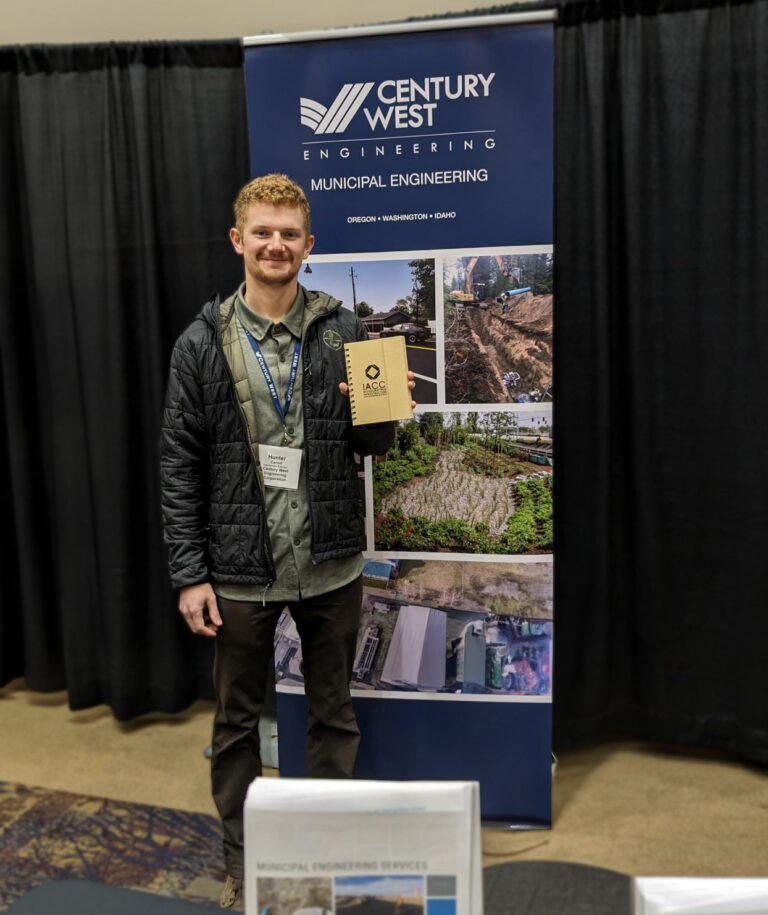Every year in October, Century West staff travel to Wenatchee, Washington to attend the Infrastructure Assistance Coordinating Council (IACC) conference. In IACC’s own words, they are a “nonprofit organization dedicated to helping Washington communities identify and obtain resources they need to develop, improve, and maintain infrastructure.” Century West encourages our clients, large and small, to attend the conference and facilitates introductions to representatives from agencies who have funding available for their projects. We asked Spokane engineer-in-training (EIT) Hunter Carroll to share his experience as a first-time attendee.
Before we jump into talking about IACC, how did you come to join the Century West team?
I was a student at Washington State University (WSU), and my advisor encouraged me to reach out to your Spokane office manager at the time. He was coming down to WSU to do an information session with my class. We met up for an hour before that session. The first half of the conversation was a discussion about what Century West’s Spokane office does, which is a lot of working for small towns that don’t have enough resources to have in-house engineers. He explained how we found them funding and designed their projects, which sounded interesting. The second half-hour we talked about hunting and fishing, so I knew the Spokane office was going to be a good fit! I received my offer letter in October, graduated in December, and started with Century West shortly after.
What are you currently working on?
I am helping Matt Morkert, PE—who suggested I attend the IACC conference with him—complete plan reviews for the City of Airway Heights. We review submittals from developers and ensure they meet City standards and any other standards the City has adopted. I am also working on a couple of inflow and infiltration projects, which include running sewer flow meters. I’ve been doing a lot of flow monitoring! I am also just starting design and drafting for the Town of St. John treatment plant project that Matt is managing.

Did you know anything about the IACC conference prior to attending?
I knew very little. I knew our clients and funding agencies would be there and that there would be presentations I could sit in on. But overall I went in pretty fresh.
What was the most interesting session?
I liked the sessions that were put on from a consultant’s perspective. One was on grant writing. They went in depth about how they work with their clients, start-to-finish, to find and administer funding, and some oddball things they encounter with grants. They had some good advice about making sure your project is a good fit for the specific application or you’re wasting your time. They also had tips on what funding agencies are looking for in applications. I also attended a session on cost estimating and how cost estimates will be different during the funding phase versus the construction phase. Overall, it was interesting to see where their processes are similar to and where they differ from what we do at Century West. There are some things I think we’re doing better but also some things I’ll bring to future projects that we could improve.
What was your favorite part of the conference?
I enjoyed meeting our clients and learning about who they are outside of project work. Same with representatives from funding agencies. I’ve been emailing a lot of people at funding agencies to close out projects. At IACC, I was able to meet a lot of them and realize we all have similar goals, which are improving our local communities and helping them succeed. I am confident that establishing these relationships will make collaborating smoother in the future.

Would you recommend attending conferences to other EITs?
Yes! Especially EITs that work with funding agencies or compliance. If you were mostly just doing drafting or design, you may not get as much out of it, but I would still recommend you go if the opportunity is there.
I told Matt on the drive back that when I first started helping with funding forms, the process seemed unnecessarily complicated and varied greatly between agencies. But now I see that it’s this way for a reason. Each agency is a fit for a certain type of project. The process is there to allow the funding to make it to the best projects in the most efficient manner. For example, not every project can be 100% grant funded as that would not be sustainable. Loans are equally important, and there is a time and place for both grants and loans.

